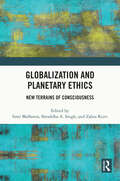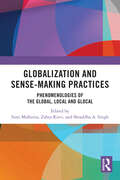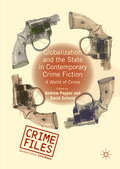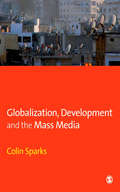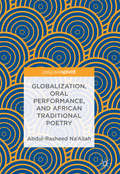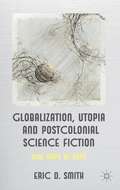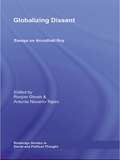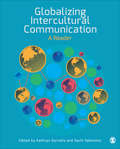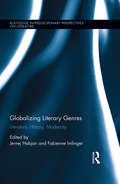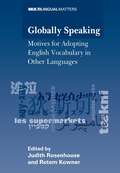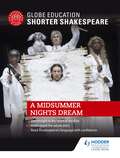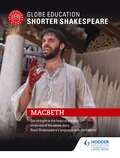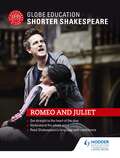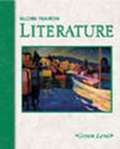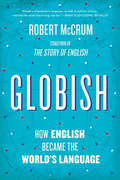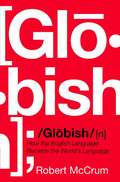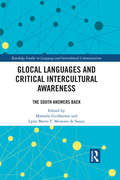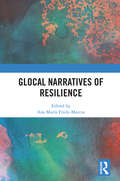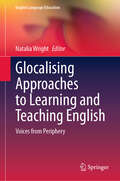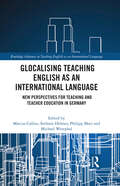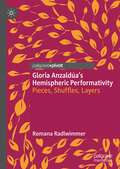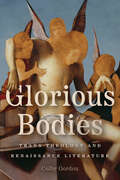- Table View
- List View
Globalization and Planetary Ethics: New Terrains of Consciousness
by Simi Malhotra Shraddha A. Singh Zahra RizviThis volume is a critical investigation into the contemporary phenomenon of the dissensus of the globe and the planet, and the new terrains of consciousness that need to be negotiated towards a possibility for transformation. It examines the possibilities of alternate, sustainable modes of being and existing in a world which requires a unified, ethical, biopolitical worldview. The book explores themes like philosophical posthumanism and planetary concerns; disruption of cultural and intellectual inequality; bodily movement through nomadic subjectivity; dystopic spatialities of game(re)play; globalization, and speculative imaginaries of the body; and theory of multiplicity. It also discusses the impact of COVID-19 on human beings, the role of the neoliberal media, the question of rights of robots and cyborgs in sci-fi movies, and representation of refugees in literature. This book will be of interest to scholars and researchers of English literature, political philosophy, cultural studies, literary cultures, post-colonial studies, critical theory, and social anthropology.
Globalization and Sense-Making Practices: Phenomenologies of the Global, Local and Glocal
by Simi Malhotra, Zahra Rizvi, and Shraddha A. SinghThis book presents a critical analysis of sense-making practices through an exploration of acoustic, creative, and artistic spaces. It studies how local cultures of sight, hearing, smell, taste, and touch are impacted by global discourses and media, such as television, popular music, digital media, and literature. The authors look at sense-making practices and spatial discourses through an interconnected discussion on thought and experience that seeks to present a multidimensional cartography of the global, the local, and the glocal, to closely analyze the phenomenon of globalization. The volume is an investigation of the possibilities of alternate, sustainable modes of being and existing in a world which requires a unified, ethical, biopolitical worldview that challenges the disparity of its fragments while speculating on their synesthetic conditionality. A unique contribution, the book will be of interest to scholars and researchers of English literature, media studies, cultural studies, literary cultures, post-colonial studies, globalization studies, philosophy, critical theory, sociology, and social anthropology.
Globalization and the State in Contemporary Crime Fiction
by Andrew Pepper David SchmidWhy has crime fiction become a global genre? How do writers use crime fiction to reflect upon the changing nature of crime and policing in our contemporary world? This book argues that the globalization of crime fiction should not be celebrated uncritically. Instead, it looks at the new forms and techniques writers are using to examine the crimes and policing practices that define a rapidly changing world. In doing so, this collection of essays examines how the relationship between global crime, capitalism, and policing produces new configurations of violence in crime fiction - and asks whether the genre can find ways of analyzing and even opposing such violence as part of its necessarily limited search for justice both within and beyond the state.
Globalization, Development and the Mass Media (Media Culture And Society Ser.)
by Colin SparksGlobalization, Development and the Mass Media gives a comprehensive and critical account of the theoretical changes in communication studies from the early theories of development communication through to the contemporary critiques of globalization. It examines two main currents of thought. Firstly, the ways in which the media can be used to effect change and development. It traces the evolution of thinking from attempts to spread ′modernity′ by way of using the media through to alternative perspectives based on encouraging participation in development communication. Secondly, the elaboration of the theory of media imperialism, the criticisms that it provoked and its replacement as the dominant theory of international communication by globalization.
Globalization, Oral Performance, and African Traditional Poetry
by Abdul-Rasheed Na’AllahThis book discusses globalization trends and influences on traditional African oral literary performance and the direction that Ilorin oral art is forced to take by the changes of the twenty-first century electronic age. It seeks a new definition of contemporary African bourgeois in terms of its global reach, imitation of foreign forms and collaboration with the owners of the primary agencies. Additionally, it makes a case that African global lords or new bourgeoisie who are largely products of the new global capital and multinational corporations’ socio-political and cultural influences fashion their tastes after western cultures as portrayed in the digital realm.
Globalization, Utopia, and Postcolonial Science Fiction
by Eric D. SmithThis study considers the recent surge of science fiction narratives from the postcolonial Third World as a utopian response to the spatial, political, and representational dilemmas that attend globalization.
Globalizing Dissent: Essays on Arundhati Roy (Routledge Studies in Social and Political Thought)
by Ranjan Ghosh Antonia Navarro-TejeroArundhati Roy is not only an accomplished novelist, but equally gifted in unraveling the politics of globalization, the power and ideology of corporate culture, fundamentalism, terrorism, and other issues gripping today’s world. This volume – featuring prominent scholars from throughout the world – examines Roy beyond the aesthetic parameters of her fiction, focusing also on her creative activism and struggles in global politics. The chapters travel to and fro between her non-fictional works – engaging activism on the streets and global forums – and its underlying roots in her novel. Roy is examined as a novelist, non-fiction writer, journalist, activist, feminist, screenwriter, ideologist, and architect. This volume presents Roy's interlocking network of the ideas, attitudes and ideologies that emerge from the contemporary social and the political world.
Globalizing Intercultural Communication: A Reader
by Kathryn Sorrells Sachi SekimotoTranslating Theory into Practice Globalizing Intercultural Communication: A Reader introduces students to intercultural communication within the global context, and equips them with the knowledge and understanding to grapple with the dynamic, interconnected and complex nature of intercultural relations in the world today. This reader is organized around foundational and contemporary themes of intercultural communication. Each of the 14 chapters pairs an original research article explicating key topics, theories, or concepts with a first-person narrative that brings the chapter content alive and invites students to develop and apply their knowledge of intercultural communication. Each chapter’s pair of readings is framed by an introduction highlighting important issues presented in the readings that are relevant to the study and practice of intercultural communication and end-of-chapter pedagogical features including key terms and discussion questions. In addition to illuminating concepts, theories, and issues, authors/editors Kathryn Sorrells and Sachi Sekimoto focus particular attention on grounding theory in everyday experience and translating theory into practice and actions that can be taken to promote social responsibility and social justice.
Globalizing Intercultural Communication: A Reader
by Kathryn Sorrells Sachi SekimotoTranslating Theory into Practice Globalizing Intercultural Communication: A Reader introduces students to intercultural communication within the global context, and equips them with the knowledge and understanding to grapple with the dynamic, interconnected and complex nature of intercultural relations in the world today. This reader is organized around foundational and contemporary themes of intercultural communication. Each of the 14 chapters pairs an original research article explicating key topics, theories, or concepts with a first-person narrative that brings the chapter content alive and invites students to develop and apply their knowledge of intercultural communication. Each chapter’s pair of readings is framed by an introduction highlighting important issues presented in the readings that are relevant to the study and practice of intercultural communication and end-of-chapter pedagogical features including key terms and discussion questions. In addition to illuminating concepts, theories, and issues, authors/editors Kathryn Sorrells and Sachi Sekimoto focus particular attention on grounding theory in everyday experience and translating theory into practice and actions that can be taken to promote social responsibility and social justice.
Globalizing Literary Genres: Literature, History, Modernity (Routledge Interdisciplinary Perspectives on Literature)
by Jernej Habjan Fabienne ImlingerFocused on the relation between processes of globalization and literary genres, this volume intervenes in the prevalent notions of globalization, literary history, genre, and the novel. Using both close reading and world history, both literary criticism and political theory, the book is a timely intervention in the debates about world, postcolonial, and transnational literature as they have been intensified by critical globalization studies, world-systems analysis, Bourdieuan sociology, and cosmopolitanism studies. It contends that globalization, far from starting in recent decades, has a long and complex history, not unlike the history of literature itself, meaning that when we speak of globalization and literature, we in effect invoke the entire history of literature. Essays examine literary genres in relation to broader historical processes, connecting the present state of globalization to such key world-historic events as the early modern geographical and scientific explorations, the Enlightenment, the expansions of modernity in the long nineteenth and twentieth centuries, postmodernity and postcoloniality, and contemporary counter-hegemonic movements. The book offers innovative readings of the pastoral from Saint-Pierre to Carpentier; the novel in Kant and Wieland, and in Diderot and Marx; travel writing from Verne to Cortázar; sports writing in James and Kahn; entrelacement in Bolaño, Ghosh, and Soderbergh; and also the Mozambican ghost story, Indian genre fiction, "fake" autobiographies, Sephardic "language memoirs," the postcolonial Gothic, Irish "chick lit," and counter-hegemonic novels. Making important theoretical contributions to a renewed discussion about genre, especially genres of narrative fiction, this volume addresses global studies, the history of the novel, and debates over periodization and nationalism in literary history.
Globally Speaking
by Judith Rosenhouse Rotem KownerThis volume accounts for the motives for contemporary lexical borrowing from English, using a comparative approach and a broad cross-cultural perspective. It investigates the processes involved in the penetration of English vocabulary into new environments and the extent of their integration into twelve languages representing several language families, including Icelandic, Dutch, French, Russian, Hungarian, Hebrew, Arabic, Amharic, Persian, Japanese, Taiwan Chinese, and several languages spoken in southern India. Some of these languages are studied here in the context of borrowing for the first time ever. All in all, this volume suggests that the English lexical 'invasion', as it is often referred to, is a natural and inevitable process. It is driven by psycholinguistic, sociolinguistic, and socio-historical factors, of which the primary determinants of variability are associated with ethnic and linguistic diversity.
Globe Education Shorter Shakespeare: A Midsummer Night's Dream
by Globe EducationExam Board: Non-SpecificLevel: KS3Subject: EnglishFirst Teaching: September 2015First Exam: Summer 2018Get straight to the heart of Shakespeare's A Midsummer Night's Dream; students' confidence and understanding develop faster as they explore the plot, themes and Shakespeare's language, which is supported throughout this abridged play text from Globe Education.This title:- Reduces the length of the play by a third, while preserving the intricacies of the plot, enabling students to engage with the whole story in the class time available- Builds understanding of Shakespeare's language by providing a detailed glossary alongside the text for quick and easy reference, plus a range of language-focused activities- Offers a tried-and-tested approach to introducing Shakespeare, based on Globe Education's shortened 'Playing Shakespeare' productions that have been seen and appreciated by over 150,000 students- Helps students form their own personal responses to Shakespeare's A Midsummer Night's Dream, stimulated by stunning photographs from Globe productions and questions that reflect on context, characters and themes- Lays the foundations for GCSE success by including activities that target the skills needed for the assessment objectivesFree teacher supportShorter Shakespeare: A Midsummer Night's Dream is supported by free online teaching resources for each scene:- Teaching notes with guidance on how to approach the scene - Practical group activities to use in the classroom- Questions on language, context, themes, character and performance - Web links to extra resources including photographs from Globe productions, interviews with actors and contextual informationThis title is also accompanied by 10 video clips from Globe Education's shortened 'Playing Shakespeare' production of A Midsummer Night's Dream.
Globe Education Shorter Shakespeare: Macbeth
by Globe EducationGet straight to the heart of Shakespeare's Macbeth; students' confidence and understanding develop faster as they explore the plot, themes and Shakespeare's language, which is supported throughout this abridged play text from Globe Education.This title:- Reduces the length of the play by a third, while preserving the intricacies of the plot, enabling students to engage with the whole story in the class time available- Builds understanding of Shakespeare's language by providing a detailed glossary alongside the text for quick and easy reference, plus a range of language-focused activities- Offers a tried-and-tested approach to introducing Shakespeare, based on Globe Education's shortened 'Playing Shakespeare' productions that have been seen and appreciated by over 150,000 students- Helps students form their own personal responses to Shakespeare's Macbeth, stimulated by stunning photographs from Globe productions and questions that reflect on context, characters and themes- Lays the foundations for GCSE success by including activities that target the skills needed for the assessment objectivesFree teacher supportShorter Shakespeare: Macbeth is supported by free online teaching resources for each scene:- Teaching notes with guidance on how to approach the scene - Practical group activities to use in the classroom- Questions on language, context, themes, character and performance - Web links to extra resources including photographs from Globe productions, interviews with actors and contextual informationThis title is also accompanied by 10 video clips from Globe Education's shortened 'Playing Shakespeare' production of Macbeth.
Globe Education Shorter Shakespeare: Macbeth
by Globe EducationExam Board: AQA, Edexcel, OCR & WJECLevel: KS3Subject: EnglishFirst Teaching: September 2015First Exam: June 2018Get straight to the heart of Shakespeare's Macbeth; students' confidence and understanding develop faster as they explore the plot, themes and Shakespeare's language, which is supported throughout this abridged play text from Globe Education.This title:- Reduces the length of the play by a third, while preserving the intricacies of the plot, enabling students to engage with the whole story in the class time available- Builds understanding of Shakespeare's language by providing a detailed glossary alongside the text for quick and easy reference, plus a range of language-focused activities- Offers a tried-and-tested approach to introducing Shakespeare, based on Globe Education's shortened 'Playing Shakespeare' productions that have been seen and appreciated by over 150,000 students- Helps students form their own personal responses to Shakespeare's Macbeth, stimulated by stunning photographs from Globe productions and questions that reflect on context, characters and themes- Lays the foundations for GCSE success by including activities that target the skills needed for the assessment objectivesFree teacher supportShorter Shakespeare: Macbeth is supported by free online teaching resources for each scene:- Teaching notes with guidance on how to approach the scene - Practical group activities to use in the classroom- Questions on language, context, themes, character and performance - Web links to extra resources including photographs from Globe productions, interviews with actors and contextual informationThis title is also accompanied by 10 video clips from Globe Education's shortened 'Playing Shakespeare' production of Macbeth.
Globe Education Shorter Shakespeare: Romeo and Juliet
by Globe EducationExam Board: Non-SpecificLevel: KS3Subject: EnglishFirst Teaching: September 2015First Exam: Summer 2018Get straight to the heart of Shakespeare's Romeo and Juliet; students' confidence and understanding develop faster as they explore the plot, themes and Shakespeare's language, which is supported throughout this abridged play text from Globe Education.This title:- Reduces the length of the play by a third, while preserving the intricacies of the plot, enabling students to engage with the whole story in the class time available- Builds understanding of Shakespeare's language by providing a detailed glossary alongside the text for quick and easy reference, plus a range of language-focused activities- Offers a tried-and-tested approach to introducing Shakespeare, based on Globe Education's shortened 'Playing Shakespeare' productions that have been seen and appreciated by over 150,000 students- Helps students form their own personal responses to Shakespeare's Romeo and Juliet, stimulated by stunning photographs from Globe productions and questions that reflect on context, characters and themes- Lays the foundations for GCSE success by including activities that target the skills needed for the assessment objectivesFree teacher supportShorter Shakespeare: Romeo and Juliet is supported by free online teaching resources for each scene:- Teaching notes with guidance on how to approach the scene - Practical group activities to use in the classroom- Questions on language, context, themes, character and performance - Web links to extra resources including photographs from Globe productions, interviews with actors and contextual informationThis title is also accompanied by 10 video clips from Globe Education's shortened 'Playing Shakespeare' production of Romeo and Juliet.
Globe Fearon Literature, Gold Level: Reading Level 9-10
by GlobeMoves students gradually from guided reading to independent reading and critical thinking with margin notes. Boosts students' interest and abilities with reading skills for each selection that help low-level readers and students moving from developmental reading classes. Broadens students' exposure to classic literature, some of which has been lightly adapted to maintain author integrity and increase comprehension.
Globe Fearon Literature, Green Level
by Global Fearon StaffWelcome to Globe Fearon Literature. As you read this textbook, you will learn about many new worlds. By reading literature you can experience the past and the future, and you can learn about people--how they feel and how they think. To get the most out of this book, you will need to become an active reader. Active readers think about reading materials before they begin, during, and after they read.
Globish: How English Became the World's Language
by Robert Mccrum"A fascinating study not only of the roots and growth of our own language but of its future."--Bloomsbury Review It seems impossible: a small island in the North Atlantic, colonized by Rome, then pillaged for hundreds of years by marauding neighbors, becomes the dominant world power in the nineteenth century. In this provocative new look at the course of empire, Robert McCrum shows how the language of the Anglo-American imperium has become the world's lingua franca. In the twenty-first century, writes the author, English + Microsoft = Globish.
Globish: How the English Language Became the World's Language
by Robert MccrumIn this provocative and compelling new work, the co-author of the bestselling book and television series "The Story of English" shows how English became the language of the world.
Glocal Languages and Critical Intercultural Awareness: The South Answers Back (Routledge Studies in Language and Intercultural Communication)
by Manuela Guilherme Lynn Mario Menezes de SouzaThis volume provides a new perspective on prevailing discourses on translanguaging and multilingualism by looking at ‘glocal’ languages, local languages which have been successfully "globalized". Focusing on European languages recreated in Latin America, the book features examples from languages underexplored in the literature, including Brazilian Portuguese, Amerinidian poetics, and English, Spanish, Portuguese outside Europe, as a basis for advocating for an approach to language education rooted in critical pedagogy and post-colonial perspectives and countering hegemonic theories of globalization. While rooted in a discussion of the South, the book offers a fresh voice in current debates on language education that will be of broader interest to students and scholars across disciplines, including language education, multilingualism, cultural studies, and linguistic anthropology.
Glocal Narratives of Resilience
by Ana María Fraile-MarcosResilience discourse has recently become a global phenomenon, infiltrating the natural and social sciences, but has rarely been undertaken as an important object of study within the field of the humanities. Understanding narrative in its broad sense as the representation in art of an event or story, Glocal Narratives of Resilience investigates the contemporary approaches to resilience through the analyses of cultural narratives that engage aesthetically and ideologically in (re)shaping the notion of resilience, going beyond the scales of the personal and the local to consider the entanglement of the regional, national and global aspects embedded in the production of crises and the resulting call for resilience. After an introductory survey of the state of the art in resilience thinking, the book grounds its analyses of a wide range of narratives from the American continent, Europe, and India in various theoretical strands, spanning Psycho-social Resilience, Socio-Ecological Resilience, Subaltern Resilience, Indigenous survivance and resurgence, Neoliberal Resilience, and Compromised Resilience thinking, among others, thus opening the path toward the articulation of a cultural narratology of resilience.
Glocalising Approaches to Learning and Teaching English: Voices from Periphery (English Language Education #41)
by Natalia WrightThis volume focuses on glocalization in English language teaching and learning, examining the challenges of its implementation. It describes the innovative practices of multilingual TESOL practitioners from various parts of the world, offering nuanced perspectives on how to glocalize teaching methods, curricula, materials, and teacher preparation. The chapters, spanning different levels of education, weave together theory and practice, highlighting strategies to successfully navigate the complex relationships between global demands and local needs in language teaching and learning. This edited book presents empirical research studies, which together provide the evidence-based knowledge necessary to effectively teach linguistically and culturally diverse students. Beyond academic discussion, this book serves as a practical guide for those involved in teacher preparation, offering strategies and practical applications of glocalized approaches to developing programs for pre-service educators. Above all, the book invites all language teaching professionals to embrace glocalization practices in response to the increasingly plurilingual and pluricultural world in which they operate.
Glocalising Teaching English as an International Language: New Perspectives for Teaching and Teacher Education in Germany (Routledge Advances in Teaching English as an International Language Series #3)
by Marcus CalliesThe worldwide spread, diversification, and globalization of the English language in the course of the 20th and early 21st centuries has significant implications for English Language Teaching and teacher education. We are currently witnessing a paradigm shift towards Teaching English as an International Language (TEIL) that aims to promote multilingualism and awareness of the diversity of Englishes, increase exposure to this diversity, embrace multiculturalism, and foster cross-cultural awareness. Numerous initiatives that embrace TEIL can be observed around the world, but ELT and teacher education in Germany (and other European countries) appear to be largely unaffected by this development, with standard British and American English and the monolingual native speaker (including the corresponding cultural norms) still being very much at the center of attention. The present volume addresses this gap and is the first of its kind to showcase recent initiatives that aim at introducing TEIL into ELT and teacher education in Germany, but which have applicability and impact for other countries with comparable education systems and ‘traditional’ ELT practices in the Expanding Circle. The chapters in this book provide a balanced mix of conceptual, empirical, and practical studies and offer the perspectives of the many stakeholders involved in various settings of English language education whose voices have not often been heard, i.e., students, university lecturers, trainee teachers, teacher educators, and in-service teachers. It therefore adds significantly to the limited amount of previous work on TEIL in Germany and bridges the gap between theory and practice that will not only be relevant for researchers, educators, and practitioners in English language education in Germany but other educational settings that are still unaffected by the shift towards TEIL.
Gloria Anzaldúa’s Hemispheric Performativity: Pieces, Shuffles, Layers (Literatures of the Americas)
by Romana RadlwimmerThis Palgrave Pivot offers new insights into leading Chicana writer Gloria Anzaldúa, investigating the dynamic composition of her texts, and situating her work in a larger hemispheric tendency of performativity emerging at the turn of the millennium. Presenting Anzaldúa as a quintessential figure of feminist and decolonial theory-making in the Americas, this book argues that the Chicana writer articulated her notions on fluctuations through “performative concepts” which did not respect the borders of single texts or editions, but organically grew through them. The offered close readings of Anzaldúa’s published works, drafts, and archive material demonstrate the constant changes and intertwined phases of her literary and conceptual production.
Glorious Bodies: Trans Theology and Renaissance Literature
by Colby GordonA prehistory of transness that recovers early modern theological resources for trans lifeworlds. In this striking contribution to trans history, Colby Gordon challenges the prevailing assumption that trans life is a byproduct of recent medical innovation by locating a cultural imaginary of transition in the religious writing of the English Renaissance. Marking a major intervention in early modern gender studies, Glorious Bodies insists that transition happened, both socially and surgically, hundreds of years before the nineteenth-century advent of sexology. Pairing literary texts by Shakespeare, Webster, Donne, and Milton with a broad range of primary sources, Gordon examines the religious tropes available to early modern subjects for imagining how gender could change. From George Herbert’s invaginated Jesus and Milton’s gestational Adam to the ungendered “glorious body” of the resurrection, early modern theology offers a rich conceptual reservoir of trans imagery. In uncovering early modern trans theology, Glorious Bodies mounts a critique of the broad consensus that secularism is a necessary precondition for trans life, while also combating contemporary transphobia and the right-wing Christian culture war seeking to criminalize transition. Developing a rehabilitative account of theology’s value for positing trans lifeworlds, this book leverages premodern religion to imagine a postsecular transness in the present.
